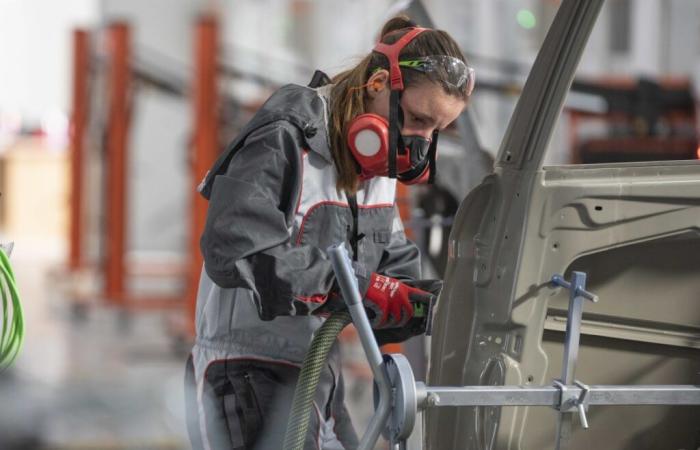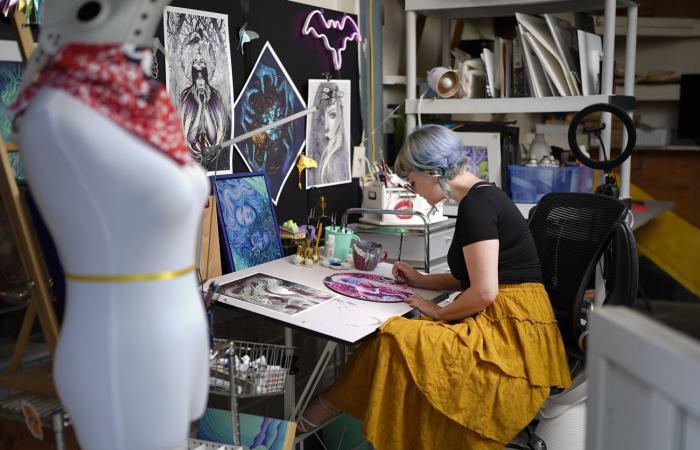Manual jobs such as mason are less at risk of being replaced by generative artificial intelligence.
Keystone
In Switzerland and around the world, younger generations are reviewing their career choices, faced with increasing automation driven by the rise of generative AI. But how does the famous Swiss dual apprenticeship system adapt to these rapid developments?
This content was published on
December 15, 2024 – 08:00
Artificial intelligence (AI) tools like ChatGPT are transforming the way we work. They are capable of creating realistic images from simple descriptions, summarizing long texts in a matter of seconds, writing emails or marketing campaigns by imitating humans. For workers in the creative sector, the explosive growth of generative AI often means lower wages or even job loss, as we recently reported.
In Switzerland, young generations leaving secondary school are taking these recent trends into account when choosing the field in which they will train. Those opting for vocational training – around two thirds of all Swiss students – are increasingly looking for jobs that are less likely to be replaced by AI-based applications.
>> Read: how generative AI threatens creative professions:
Plus
Plus
Artificial intelligence affects creative professions in Switzerland
This content was published on
19 sept. 2024
AI software is putting more and more pressure on people working in creative fields. This global trend is transforming the job market.
read more Artificial intelligence affects creative professions in Switzerland
“Since the launch of ChatGPT, we have observed a significant drop in interest in certain previously highly sought-after apprenticeships, such as those in the administrative field, in favor of manual trades such as masonry,” indicates Daniel Goller, lead author of a recent analysis who took as his field researchExternal link carried out on a platform dedicated to learning.
Manual jobs have long been considered the most at risk of being replaced by machines. However, generative AI cannot take on masonry work. Nor do they practice professions that require empathy and a relationship with humans, such as those of a nurse, therapist or teacher. This type of job, which is difficult to automate, will undoubtedly remain essential, including in a world boosted by AI.
An international investigationExternal link conducted by the consultant Deloitte shows that six out of ten young people belonging to generations Z and millennials (thus born between 1981 and 2012) expect to retrain by acquiring skills resistant to automation or linked to AI, ever more requested.
Job postings for junior roles requiring AI skills, social skills and managerial abilities have increased by 91% over the past year globally. A trend that is particularly visible in the education, tourism, maintenance, IT and finance sectors, according to the firm Lightcast, which specializes in labor market analyses.
Vocational training systems like that of Switzerland, considered among the best on the planet, must therefore follow the rapid evolution of technologies in order to prepare workers for the demands of an increasingly automated market.
Less interest in certain learning
In the eyes of Daniel Goller, this evolution of professional interests among young people is not surprising, especially in Switzerland, where most boys and girls begin vocational training after compulsory school, often as part of an apprenticeship. in business. “For teenagers, it doesn’t make sense to spend three years of their life learning a profession that risks being replaced by AI.”
They have around 240 different professions to choose from. Since ChatGPT’s arrival on the market, Daniel Goller and his colleagues at the University of Bern have noted an 18% drop in young people’s interest in business and administrative apprenticeships, particularly those requiring cognitive and linguistic skills. high, easily satisfied by models like ChatGPT. For jobs previously considered at high risk of automation, involving manual and repetitive tasks, interest has declined by just 3%.
Plus

Plus
What are your experiences with artificial intelligence in the workplace?
How do you use AI professionally? Has AI caused you to lose or find work? Let me know your experiences!
read more What are your experiences with artificial intelligence in the workplace?
These results come from the analysis of millions of searches on orientation.ch, the leading Swiss platform for learning offers.
Targeting professions less likely to be automated, such as those in health and social services for example, could well be a strategic approach. Employment in these sectors is growing rapidly and could double in the future, according to data from the Swissstaffing association.
“A well-thought-out, future-oriented career choice can enable apprentices to position themselves optimally on the job market,” assures Marius Osterfeld, responsible for economics and policy at the association.
AI as a career opportunity
If in Switzerland many future workers are looking for careers in more stable sectors, the majority of them consider digitalization, including AI, as an opportunity to improve their prospects rather than as a threat. Only a quarter of young people surveyed as part of the 2024 Transitions BarometerExternal link (a survey including two thousand young people and three thousand companies in the country) believe that AI will reduce the opportunities offered to them in the job market.
“Young people view digitalization with optimism and AI as an important element in the future of humanity,” notes Martina Mousson, political scientist at the gfs.bern institute, which led the project on behalf of of the State Secretariat for Training, Research and Innovation (SERI).
That said, the survey shows that more than 40% of respondents (between 14 and 17 years old) fear that their skills will become useless due to digitalization. It also reveals an evolution of professional preferences similar to that observed by the University of Bern.
In 2024, the popularity of administrative apprenticeships, long among the most sought-after in the country, will decline significantly for the first time in six years. At the same time, professions such as hairdresser, nursing assistant and dental assistant enter the top 10.
Martina Mousson considers that it is too early to draw strict conclusions: “Artificial intelligence may have influenced this decline but to say so definitively would be pure speculation.”
The Swiss Society of Commercial Employees also maintains that evidence is still lacking to confirm that tools like ChatGPT have influenced the professional options of young people. Official cantonal dataExternal link show that interest in professional training in the commercial field has been stable over the last fifteen years, with a slight decline since 2016 (-0.9% per year), attributed to demographic change. But these statistics extend to 2022, before the explosion of generative AI.
If certain repetitive tasks, such as accounting, are already automated, staff whose role requires technical understanding and communication with customers will remain essential, assures Melinda Bangerter, head of training at the Swiss Society of Commercial Employees.
Plus

Plus
Want to know more? Subscribe to our newsletter
Subscribe to our newsletter for the Fifth Switzerland and receive our best articles in your inbox every day.
read more Want to know more? Subscribe to our newsletter
A system resilient to AI
To align education with the demands of the labor market, the Swiss government has already taken measures. In 2023, he revised the initial sales trainingExternal link to strengthen digital skills and the use of AI. This reform also aimed to better integrate transversal faculties such as creativity, problem solving and interpersonal communication. All apprentices will have to learn two foreign languages. Vocational training programs are generally reviewed every five years in collaboration with professional associations and employers.
With its characteristics, the Swiss-style learning system could prove more resilient in the face of changes induced by AI than that of other countries such as Italy, France or Spain. Countries affected by youth unemployment exceeding 10% and dependent on less developed vocational training programs.
So far, the Swiss education system has managed to adapt to disruptive technologies like the Internet as well as crises like the recent Covid-19 pandemic. “Even then, what young people wanted to do and learn hardly changed,” notes Martina Mousson.
At the University of Bern, Daniel Goller is optimistic. The risks do not prevent him from remaining convinced that generative AI will not significantly affect the employment opportunities of young Swiss people. “The Swiss vocational training system is well anchored in the real needs of businesses. He will be able to meet the challenges ahead.”
Text proofread and verified by Sabrina Weiss and Veronica De Vore, translated from Italian by Pierre-François Besson/sj









